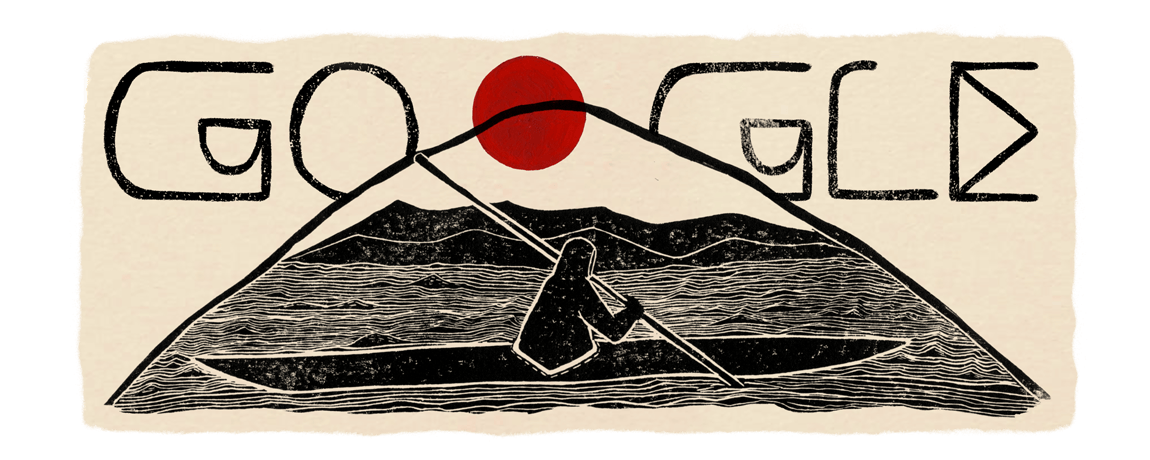
- Details
- By Native News Online Staff
In recognition of Native American Heritage Month, which is celebrated during the month of November, Google today used as its daily theme a kayak on its homepage.
This Native American History Month Doodle, created by Inuit Nunangat artist Natashia Allakariallak, honors the kayak—a remarkable watercraft with a history that spans thousands of years. Originally designed for hunting, fishing, and transportation, the kayak has evolved into a popular recreational activity and competitive sport enjoyed worldwide today.
Indigenous people from the Arctic communities, including the Inuit, Aleut, Inupiat, and Yup’ik peoples, used the kayak for hunting purposes. The word kayak itself is rooted in the Inuit language, where "qajaq" means "hunter’s boat."
These early kayaks were meticulously crafted from animal skins, bones, and driftwood to navigate cold and often perilous waters. The boats were crucial tools for hunters, offering stealth and agility to capture fish, seals, whales, and other prey in even the most challenging conditions.
The kayak term originates from one of the 14 dialects in the Inuit-Yupik-Unangan language family. Kayaks were custom-built by hunters, each one tailored to their specific size, weight, and needs—considered not just tools, but an extension of the person using them.
Today, kayaking has become a global sport, from tranquil lake excursions to thrilling whitewater challenges. Yet, we owe its existence and widespread enjoyment to the ingenuity of the Northern tribes, whose ancestral designs continue to inspire this beloved activity.
More Stories Like This
Native News Weekly (August 25, 2024): D.C. BriefsUS Presidents in Their Own Words Concerning American Indians
Indigenous Actor Elaine Miles Reports Detention by Alleged ICE Agents
Happy Thanksgiving from Native News Online
Coming Up on Native Bidaské: Behind the Animation: Joey Clift Talks “Pow” and Native Storytelling
Help us tell the stories that could save Native languages and food traditions
At a critical moment for Indian Country, Native News Online is embarking on our most ambitious reporting project yet: "Cultivating Culture," a three-year investigation into two forces shaping Native community survival—food sovereignty and language revitalization.
The devastating impact of COVID-19 accelerated the loss of Native elders and with them, irreplaceable cultural knowledge. Yet across tribal communities, innovative leaders are fighting back, reclaiming traditional food systems and breathing new life into Native languages. These aren't just cultural preservation efforts—they're powerful pathways to community health, healing, and resilience.
Our dedicated reporting team will spend three years documenting these stories through on-the-ground reporting in 18 tribal communities, producing over 200 in-depth stories, 18 podcast episodes, and multimedia content that amplifies Indigenous voices. We'll show policymakers, funders, and allies how cultural restoration directly impacts physical and mental wellness while celebrating successful models of sovereignty and self-determination.
This isn't corporate media parachuting into Indian Country for a quick story. This is sustained, relationship-based journalism by Native reporters who understand these communities. It's "Warrior Journalism"—fearless reporting that serves the 5.5 million readers who depend on us for news that mainstream media often ignores.
We need your help right now. While we've secured partial funding, we're still $450,000 short of our three-year budget. Our immediate goal is $25,000 this month to keep this critical work moving forward—funding reporter salaries, travel to remote communities, photography, and the deep reporting these stories deserve.
Every dollar directly supports Indigenous journalists telling Indigenous stories. Whether it's $5 or $50, your contribution ensures these vital narratives of resilience, innovation, and hope don't disappear into silence.
 The stakes couldn't be higher. Native languages are being lost at an alarming rate. Food insecurity plagues many tribal communities. But solutions are emerging, and these stories need to be told.
The stakes couldn't be higher. Native languages are being lost at an alarming rate. Food insecurity plagues many tribal communities. But solutions are emerging, and these stories need to be told.
Support independent Native journalism. Fund the stories that matter.
Levi Rickert (Potawatomi), Editor & Publisher

